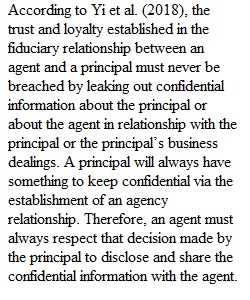


Q To continue our discussion about the agency relationship, I think its important to dicuss "why" employers hire workers as employees or independent contractors. A the heart of this dicussion is two legal areas: (1) contracts and tort liability. In the former, let examine the issues revolving the authority in which an agent can legally bind the prinicipal contractually with a 3rd party. If their is a breach of contract prompted by the actions of the principal, the princiapl is certainly liable for said breach. But if either the principal or the 3rd party breach the contract, the agent may have some legal exposure as well. In many case, their exposure is based on how well the principal is disclosed to the 3rd party by the agent. In the latter, the courts have made a very clear distinction when a business is liable for the tort committed by their worker. But such liability is based on certain factors and depends on the classification of the worker as an employee or as an independent contractor. At the heart of this discussion is the latin term, Respondeat Superior. So lets take a look at these issues this week. You may have to do a bit of research on your own on theses topics since they are outside of the course lecture and readings this week. But this is a good thing! Question 1: Class - Lets begin our weeks discussion about contract liability. Last week we already established that an agent is given certain authority to act on behalf the the company in which they are empolyed. No clearer is this authority exercised by an agent as to when they are binding a 3rd party contractually with the principal. Every sales contract that is executed between a sales person and a company by some type of sales associate or saleperson demonstrates this authority. So when the Macy's sales associate makes a sale, they are entering Macy's into a contractual relationshop with that shopper. Same for the sales associate a Sprint when they sell a phone and a service agreement with a customer and the Amazon CFO when they seek to obtain a loan from a financial institution on behalf of Amazon. In every instance, a agent is disclosing certain information about the principal. Disclosure of the principal by the agent to the 3rd party takes on two parts: (1) disclosure of the existence of the principal and (2) disclosure of the princial by name. There are 3 types of disclosure relating to contract law: (1) fully disclosed principal, (2) partially disclosed principal and (3) non-disclosed principal. As the name implies, a fully disclosed principal is disclosed to the 3rd party by existence and name. Partially disclosed princiapl is by existence and not name. And a non-disclosed principal is the existence of the principal to the 3rd party is not revealed at all. All of this begs a few questions.... QUESTION: Does the agent owe a duty to disclose the principal to the 3rd party at all? Must they disclose?
View Related Questions